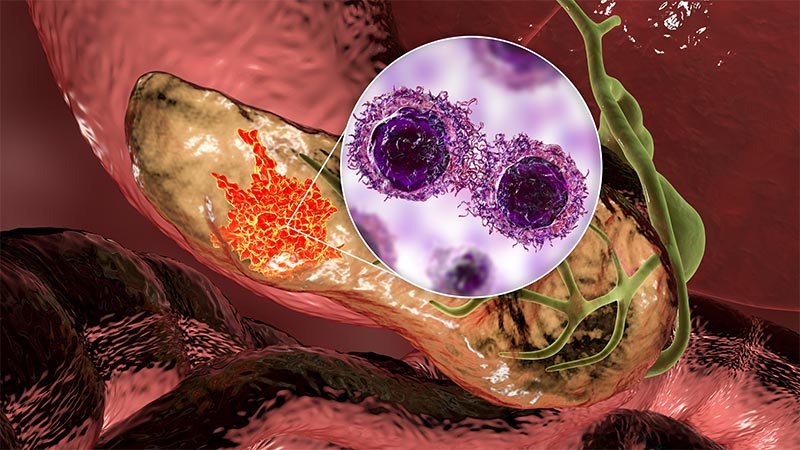Metastatic pancreas ductal adenocarcinoma (PDAC) is an aggressive form of cancer with limited treatment options and a poor prognosis. By 2030, pancreatic cancer is expected to be the second leading cause of cancer-related mortality. Gulam A. Manji, MD, PhD, Co-Director of the Pancreas Center and Director of Gastrointestinal Medical Oncology at NewYork-Presbyterian and Columbia, is leading a promising clinical trial that has the potential to change the treatment paradigm and improve survival. His team has previously shown that a combination of a standard chemotherapy treatment, immunotherapy, and a CXCR4 inhibitor can shrink pancreas tumors in mice.
Now, Dr. Manji is the principal investigator for the first-in-human study known as Chemo4METPANC and is looking at this regimen, which is currently underway at NewYork-Presbyterian and Columbia and Brown University, and soon to start at three other medical centers. Below, he describes the rationale for this approach and the next steps in this investigator-initiated trial.

The Chemo4METPANC trial explores the combination of chemotherapy, immunotherapy, and a CXCR4 inhibitor to improve progression-free survival for metastatic pancreas cancer.
Building on Previous Research
Several years ago, a group of researchers demonstrated the potential of combining immunotherapy and a CXCR4 inhibitor to target pancreas tumors in mice. That was the first evidence that some combination of immunotherapy resulted in tumor shrinkage in the mouse model, and it was an intriguing discovery. When you look at pancreas tumors in patients, you find cluster of tumors cells that resemble islands which are intermixed with cancer fibroblasts. These cancer fibroblasts release chemicals that do not allow the immune cells to enter near them, which prevents the immune cells from coming in close proximity to the tumors. The CXCR4 inhibitor allows the immune cells to enter the tumor and, in combination with immunotherapy, can theoretically contain the tumor to the pancreas. Our group sought to extend that early finding and tested a new combination treatment strategy that uses standard chemotherapy, immunotherapy, and a CXCR4 inhibitor.
Conducting a Pilot Study
Over the five years, our group tested seven different treatment combinations in mice to determine which regimen produced the longest survival. Recently, we took the most promising combination and tested it in a pilot clinical trial of 11 human patients with stage 4 (metastatic) PDAC. Patients in the pilot study received motixafortide (a CXCR4 inhibitor), cemiplimab (an immune checkpoint inhibitor), and standard chemotherapy with gemcitabine and nab-paclitaxel.
The goal of our pilot clinical trial was to evaluate whether this combination was safe and if it would shrink tumors. In those 11 patients, nearly two-thirds had tumor responses, far outpacing the typical response rate for chemotherapy alone. Given this promising initial data, we decided to move to a phase 2, randomized controlled trial that would compare this new CXCR4/immunotherapy/chemotherapy regimen against chemotherapy alone.
Our primary endpoint is progression-free survival, and we think the trial will be considered promising if the experimental combination therapy can increase that survival to over nine months.
— Dr. Gulam Manji
Outcomes to Watch
Over the last few months, we started enrolling and randomizing patients 2:1 to either the CXCR4, immunotherapy, and chemotherapy regimen or chemotherapy (gemcitabine and nab-paclitaxel) alone. Our goal is to enroll 108 treatment naïve patients with metastatic PDAC at five sites across the United States. Our primary endpoint is progression-free survival, and we think the trial will be considered promising if the experimental combination therapy can increase that survival to over nine months.
Next Steps
If the current study is successful, the next step is to move to a phase 3 trial that would examine the individual contributions of the regimen. The question will be to determine which of the following lead to the best progression-free survival:
- Chemotherapy alone;
- Chemotherapy with a CXCR4 inhibitor; or
- Chemotherapy with a CXCR4 inhibitor and immunotherapy.
My hope is that with this trial, and other promising trials as well, that we will be treating pancreas cancer patients with new drugs and combinations that will extend survival. Inquiries about participation in this trial can be directed to cancerclinicaltrials@cumc.columbia.edu.




